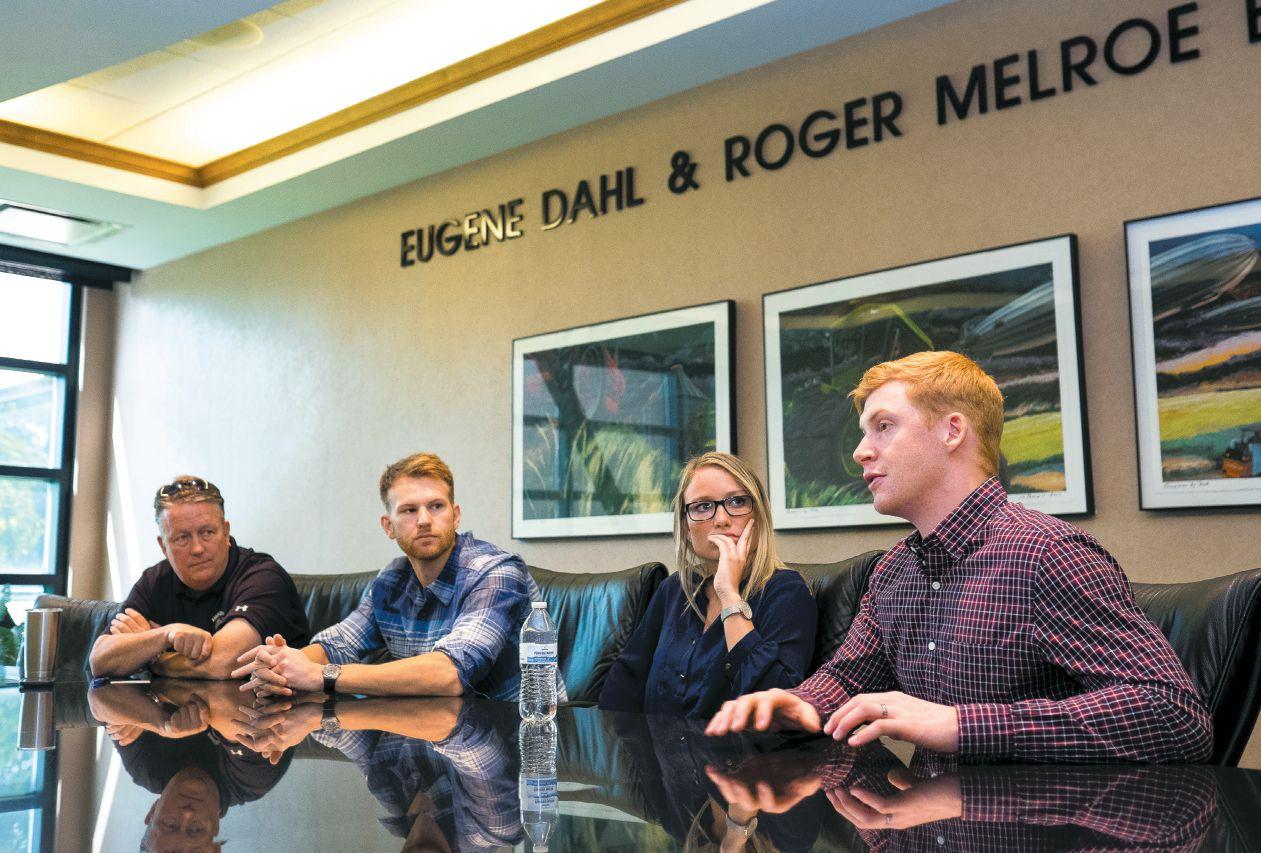
9 minute read
North Dakota ventures forth
When a North Dakota entrepreneur sought to buy the fledgling Great Plains Software in 1984, his family’s grain elevator business provided the venture capital.
Why? Because in 1984, there were few other places besides family where then-entrepreneur, now-Gov. Doug Burgum could turn.
That has changed.
These days, civic leaders celebrate entrepreneurship throughout the Prairie Business area, hundreds of people pack Start Your Own Company events – and a venture capital network helps power this effort like a uranium core.
No, the Dakotas’ venture-capital numbers aren’t going to rival California’s anytime soon. PWC MoneyTree ranks annual investment amounts and number of deals by state, and the Great Plains states –including the Dakotas – still rank last.
Nevertheless, the progress in the Dakotas has been dramatic, as shown by Forbes magazine, Area Development and CNN Money repeatedly ranking the region’s communities as outstanding cities in which to start a business.
The energy is to the point where “if somebody was in Fargo and they told me, ‘I don’t know what to do with my idea,’ I’d tell them, ‘You’re not trying hard enough’,” said Andy Christensen, director at Arthur Ventures, the Fargo-based venture-capital company that Burgum and nephew Jim Burgum founded in 2007.
“There are plenty of places you can go,” including organizations such as Emerging Prairie for advice and a lineup of companies and agencies for grants, investment dollars and loans.
All of them agree with the point Arthur Ventures was founded on, which is the following: “We believe great companies can be built anywhere,” Christensen said.
Loan vs. ownership
Understanding venture capital in the Northern Plains starts with understanding venture capital itself. As the Harvard Business Review once described, “venture capital’s niche exists because of the structure and rules of capital markets. Someone with an idea or a new technology often has no other institution to turn to.”
That’s because a mere idea generally isn’t enough to convince banks to offer a loan, said John Cosgriff, incubator manager at North Dakota State University’s Research and Technology Park.
After all, “the primary criteria for making a loan is the ability to cashflow and repay. So, if you’re a banker and you’re looking at a startup company that has no revenues, no income and no profit, it’s very difficult to make a loan.”
Venture capital fills that void. The difference, of course, is that in return for taking on the higher risk, venture capitalists seek a higher reward: equity – meaning ownership.
That way, they’re positioned to get not the gradual return of interest on a loan, but the possible quadrupling, quintupling or even greater compounding of their investment when a successful startup takes off.
Understand, few startups enjoy that outcome, in the Dakotas or anywhere else. “Out of our 12 investments, seven have gone under,” said Tom Kenville, UND Center for Innovation Foundation rainmaker, speaking about a fund he’s involved with.
“But I have three that are looking really good.” And that’s the life of a VC investor: high risk, but marked on significant occasions by thrillingly high rewards.
For decades, neither the economies nor the culture of the Dakotas supported taking on that very special risk. Farming and oil, not tech, were the mainstays. And back then, “there were more people than jobs,” said Dean Reese, CEO of the North Dakota Department of Commerce’s Development Fund.
“I’ve been at the Development Fund for 19 years,” Reese said. “I was a banker before that.
“And when I first started at the fund in 1997, there were no organized angel investment programs. Arthur Ventures, the Dakota Venture Group – none of those programs were there when I started.”
The programs’ absence before 2000 is why their presence matters today.
The DVG
Take the Dakota Venture Group. The University of North Dakota student-run effort was the first and remains the only fully student-run venture capital fund in the United States. The vision of former Center for Innovation Director Bruce Gjovig and a $300,000 donation from retired venture capitalist Bart Holiday helped launch the fund in 2006.
Today, the group manages a total of $1.8 million in two funds, and UND student members continue to make all of the investment decisions.
That includes “deal sourcing, screening, due diligence, negotiating investment terms, syndication, portfolio management and exits for a return on investment,” as the group’s website notes.
Student members face a steep learning curve. “You’re thrown into it for sure, especially as students, because we have no background in this,” said Andrew Allen, the group’s chairman and an entrepreneurship and business management major.
“So catching up on 10 years of material – knowing what we’ve invested in, learning our mistakes and successes – you’ve got to learn quick, just to make sure we keep making sound investments.”
The experience is as real-world as it gets: “One year, we evaluated about 180 companies,” said Emily O’Brien, the group’s immediate past chairman and a North Dakota state representative.
“Out of that 180, I think we invited 60 to do presentations. We were seeing three or four company presentations a night, which made for a lot of three-hour meetings.”
Then out of those 60 presentations, DRG invested in about three.
The funds’ $25,000 to $100,000 investments are modest in venturecapital terms, but the money does more than support entrepreneurs. It generates intellectual returns: “If you talk to anybody from the Dakota
Venture Group, they’ll say they learned more there than they did in the classroom,” said Greg Syrup, a UND grad who’s now a partner at 701 Angel Fund in Grand Forks.
As important, the group’s 150 former members are human “seed capital,” as many of them now populate the region’s venture funds, investment firms and startup companies.
“I knew it was a unique experience, but I didn’t realize how unique,” said Christensen, the Arthur Ventures director and a Dakota Venture Group alum.
“Not even Stanford or the Ivy League schools have a program like DVG. I look back at my years at UND, and that was a very impactful and influential program, probably the place where I learned the most.”
Speaking of Arthur Ventures, that company, too, has played an outsized role in elevating venture capital’s influence and availability in the region.
Remember, “if you think it’s hard raising money now, think about Doug Burgum back in 1983,” Christensen said.
“The family-run business was his venture capital.” Such a situation seemed unfair, especially to promising entrepreneurs who lacked family wealth, Burgum felt.
In 2007, after Burgum had sold Great Plains Software to Microsoft for $1.1 billion and been a Microsoft executive for several years, he and
James Burgum founded Arthur Ventures. “The thinking was, ‘There are so many great entrepreneurs who are building companies in North Dakota and beyond who don’t have access to capital,” Christensen said.
Wanted: More companies
To repeat, the scale of these events shouldn’t be exaggerated. North Dakota now has Arthur Ventures, but it needs a dozen similar firms, said Arthur Ventures co-founder James Burgum to EmergingPrairie. com in 2015.
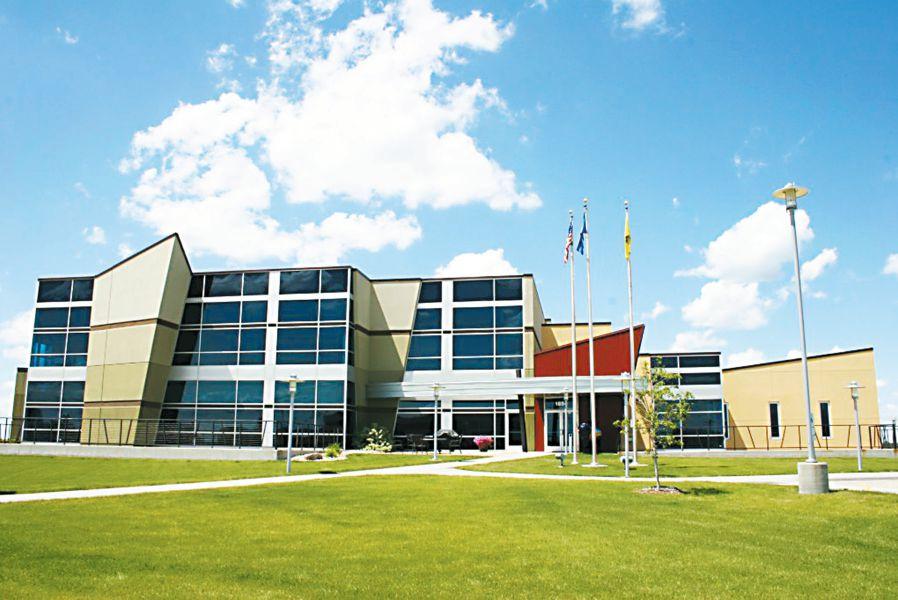
And “we need two dozen angel funds,” Burgum said.
“We need to have a lot more investment in and around the startup economy if this is something we are serious about.”
Lingering skittishness surfaced at the 2017 legislative session, when lawmakers expressed dismay over tax credits going to venture capital investors who’d invested out of state.
Here’s a concept North Dakotans should consider before the next session in 2019: “If a North Dakota venture capital fund puts a million dollars into a Colorado company, and that company grows and the fund gets a $10 million return, the investors in that fund are all North Dakota taxpayers,” said Cosgriff of NDSU’s Research and Tech Park.
“They’ve just taken $10 million of new income into the state. They’re going to pay taxes on it, they’re going to consume, the multiplier effect is going to show up throughout the economy.”
Moreover, a state reaps other rewards when its venture-capital companies succeed, because the dynamism of that sector is essential to attracting new talent and industries.
That’s why the state Department of Commerce’s InnovateND program provides outright grants (as well as training, structure and advice) to especially promising young companies.
It’s why as recently as May, the Bank of North Dakota announced a new focus on venture capital, including the launch of a $1.5 million seed-capital effort -- money to be used in startups’ very early stage.

“We exist to fund economic development,” said BND President Eric Hardmeyer at the announcement.
“That’s at our core. … And right now, the emerging need that we see is that North Dakota needs to diversify. We’re all on this roller coaster of commodities, and the upward trends are a lot of fun, but the busts are hell.
“We decided, what better way (to encourage diversification) than to help entrepreneurs and businesses develop?”
Kenville of the Center for Innovation Foundation agreed. “We are still conservative in North Dakota,” he said. But the state now has a governor who understands startups, and who knows “we need to grow businesses like the one he had.”
In other words, the state isn’t yet “good” at venture capital, Kenville said. But it’s a lot better than it was.
“Before, we could just help you with your business plan and then say, ‘Good luck,’” he said

“But today, between InnovateND, the Development Fund, the angel funds, the DVG, Arthur Ventures and so on, we can take you from a few sales and an idea to all the way to the end.
“We’ve come a long way.” PB
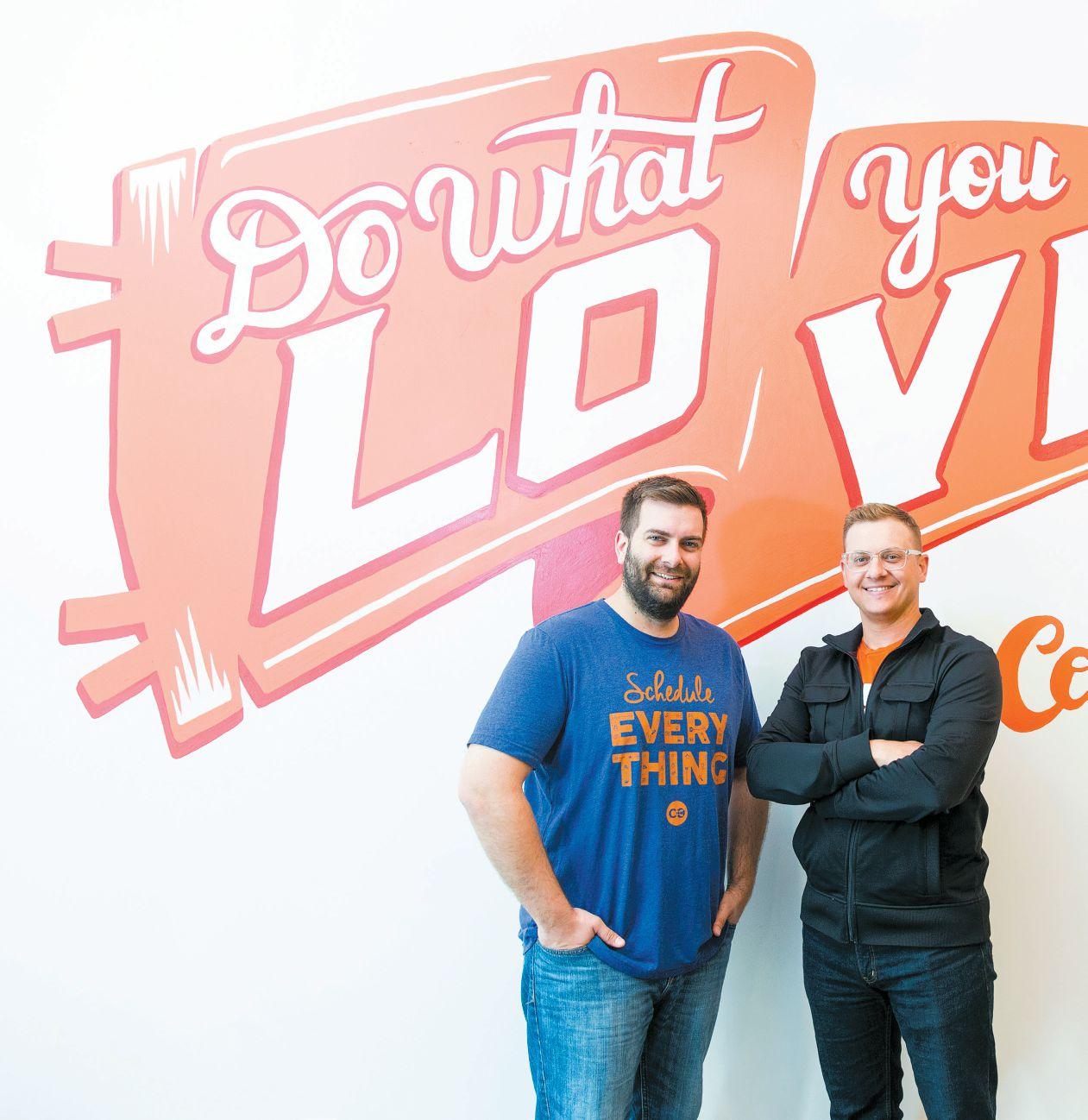
By Rob Swenson
BISMARCK, N.D. – Garrett Moon sounds confident as well as hopeful when he talks about the future of his growing, technology-based company.
“I think we’re writing one of the next big success stories in North Dakota,” he said. “We’re writing another chapter of technology success.”
Moon is the CEO and co-founder of CoSchedule, a North Dakota company that sells businesses access to a web app that helps marketers collaborate, schedule, organize workflow and automate activities such as social media campaigns.
The marketing calendar company, which is emerging as a leader in its niche, was founded in 2013 by Moon and Chief Technology Officer Justin Walsh, who leads product engineering.
CoSchedule started in Bismarck and also has offices in Fargo. It recently expanded its space in Bismarck and is relocating and expanding its space in Fargo. The company has about 45 employees and plans to add about 50 more during the next 18 months.
Mark your calendar for CoSchedule, a North Dakota startup whose web app already is in use worldwide

The company serves about 8,500 clients in more than 100 countries and is experiencing steady growth. An injection of $2.2 million in investment financing earlier this year has helped move the company into a higher level of planned expansion.
About $600,000 in the recent investment came from the North Dakota Development Fund, and $400,000 came from the Bank of North Dakota’s New Venture Capital Program. The Development Fund is a nonprofit within the North Dakota Department of Commerce. The Development Fund staff also administers the state bank’s New Venture Capital Program.
CoSchedule “is a great success story for the North Dakota Development Fund, the Bank of North Dakota and the state of North Dakota,” said Scot Long, vice president of the Development Fund.
The investment entities want to help primary sector businesses bring new wealth into the state, Long said.
“We really see some big opportunities in the market,” Moon said.
CoSchedule brashly promotes itself on its website as “the tiger” of startups. “Hustle isn’t just a saying here. We work hard, fast, and at a level of excellence our competition only dreams of,” according to the website.
Eric Piela, head of public relations and community management, said CoSchedule’s drag-and-drop calendar software is an easy-to-use, centralized hub for marketing projects. “We see it as one consolidated platform for marketers to go to stay organized and get things done,” he said.
CoSchedule opened in Bismarck in August 2013 and launched its calendar service in September 2013. The company had 5,000 customers within two years. The company expanded business operations to Fargo in October 2015.
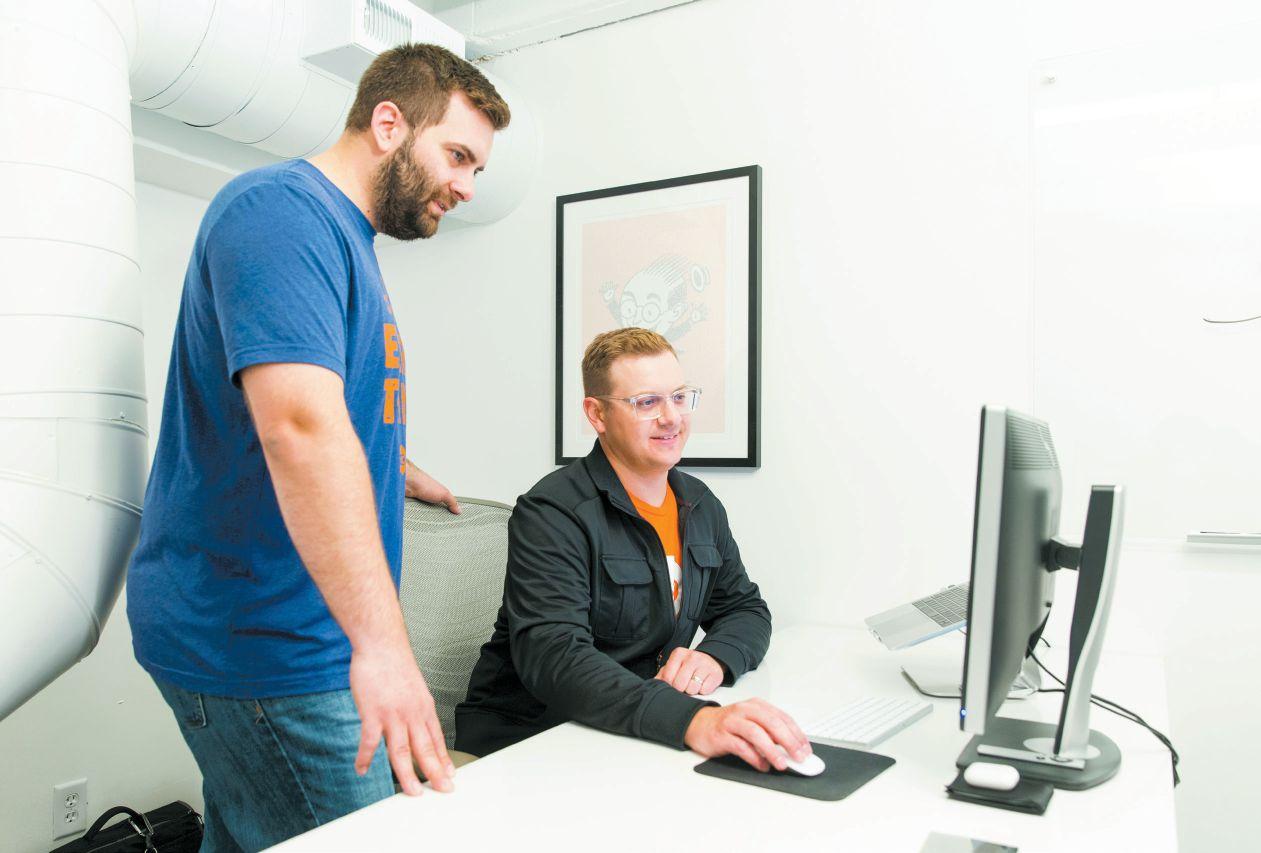
CoSchedule only recently put a sales team in place. “The product sold itself, for the most part. Customers came to us by word of mouth,” Moon said.
The startup has been successful because it provides a service that customers want and because the company listens to customer feedback to make products better, Moon said. “It’s common for us to release a feature and revise it after launch,” he said.
Customers pay a monthly or annual fee for using the unique software. A blogger or solo businessperson pays $30 per month for access to a marketing calendar, for example. A professional marketing firm with up to 25 users would pay $300 a month. Rates scale up to as much as $1,600 a month for the most advanced, multi-calendar option.
The company’s customers include some big-name businesses, including Microsoft, The Home Depot, Uber and eBay.
Discovery Benefits, another North Dakota-based company, has been a client since the end of 2016, said Abby Boggs-Johnson, director of marketing and creative services at Discovery. Discovery administers employee benefits for other companies. Most of Discovery’s 700 employees are based in Fargo, but about 100 of its workers are based in Brookings, S.D., and 100 others work remotely.
Discovery uses CoSchedule’s calendar to manage social media accounts, Boggs-Johnson said.
“It’s nice for us. We like to work ahead,” BoggsJohnson said.
One reason why Moon and Walsh started CoSchedule was because they couldn’t find the right jobs, Moon said. “It was partly to scratch our itch and partly because we saw an opportunity for clients,” he said.
The company takes great pride in being North Dakota-based. Moon sees the location as an advantage and differentiator for CoSchedule. Any business location presents advantages as well as challenges; but for entrepreneurial companies such as CoSchedule, the main challenge is to solve customers’ problems, he said.
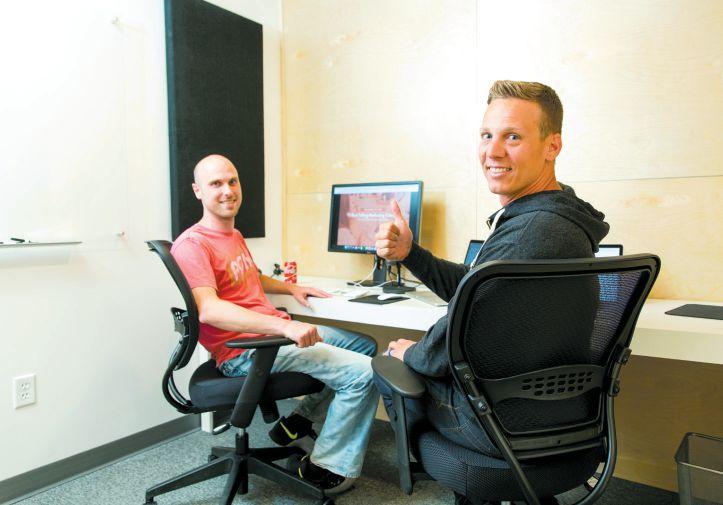
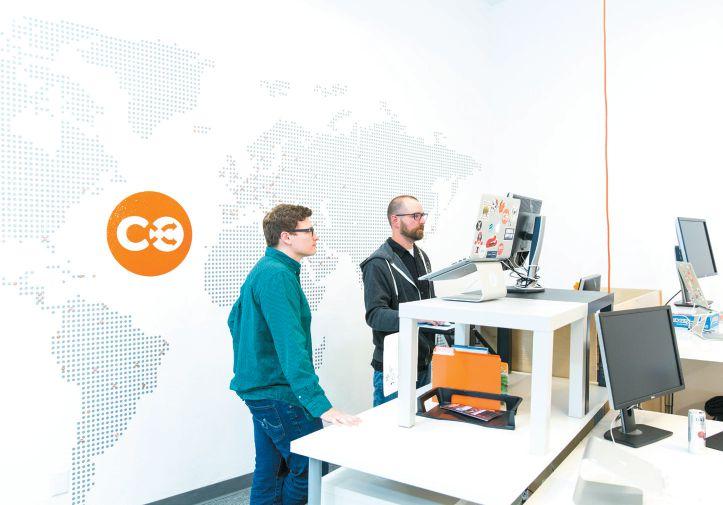
CoSchedule wants to provide work opportunities for people who want to live in North Dakota and stay at the leading edge of development, Moon said.
“In North Dakota, we have the potential to be one the best gigs in town,” he said. “We want to be a worldclass startup. There is nothing stopping us.” PB
Rob Swenson SPECIAL TO PRAIRIE BUSINESS ROBSWENSONMEDIASERVICES@GMAIL.COM










